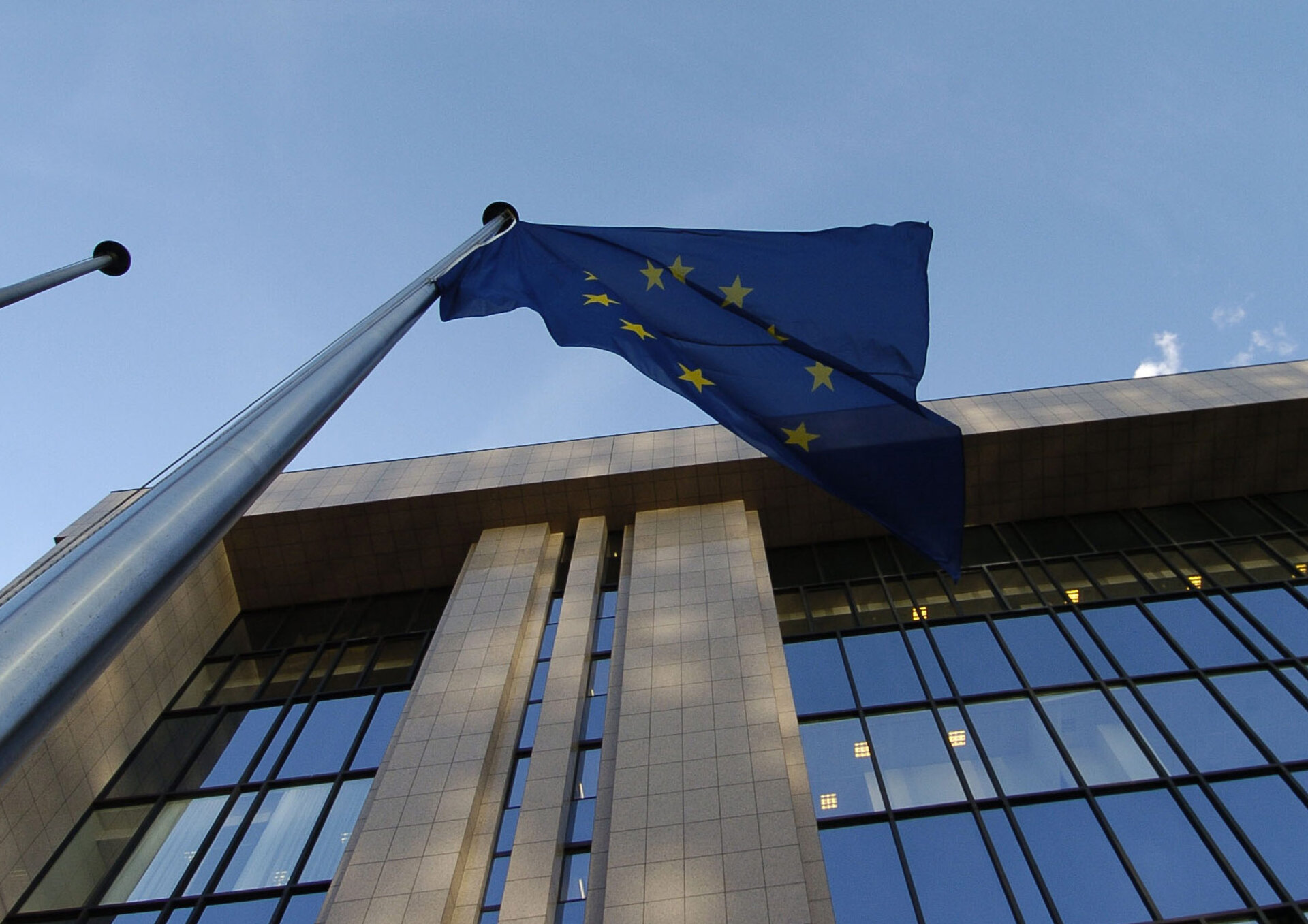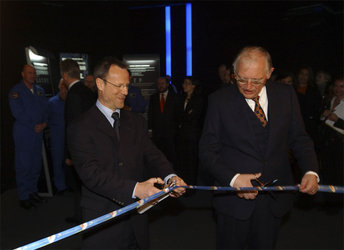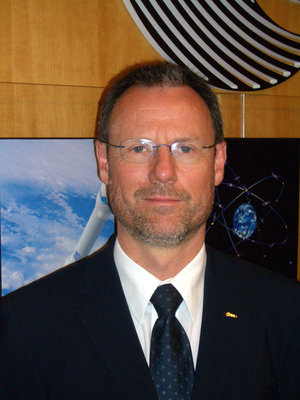Benefits of space for all citizens
ESA PR 11-2005. Over 40 nations and around 20 international organisations, including ESA, have come together in Brussels for two days, today and tomorrow, to exchange views on policies related to international cooperation in space.
Entitled ‘Winning through cooperation: sharing the benefits of space’, the conference provides a forum for discussion between States capable of providing space technology – the supply side – and those willing to make use of it – the demand side. The conference was jointly organised by the European Commission and ESA in response to a perceived need to set up a platform for dialogue between the two sides.
The conference is also being attended by a strong contingent of representatives of the European space industry, which has become a key player on worldwide commercial markets in satellite manufacture, launch services and satellite operations.
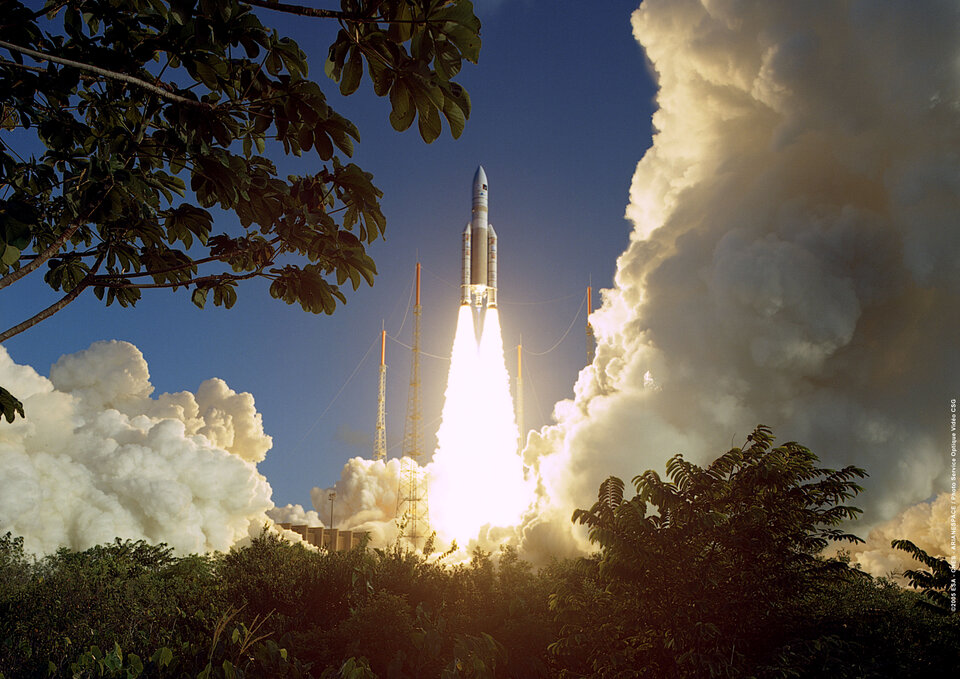
Attending the conference, ESA Director General Jean-Jacques Dordain stated: “The successful launch of Ariane 5 a few days ago (Saturday 12 February) brought us ‘back to the future’, boosting Europe’s guaranteed access to space. And this outstanding achievement comes only a month after the discovery of a new world through the spectacular descent of ESA’s science probe Huygens onto Titan.
These are just two concrete examples of international cooperation: Ariane shows what several European states have been able to accomplish together in 30 years of cooperation within ESA, while Huygens - reaching Titan after a 7-year journey on board NASA’s Cassini mothership - can be listed among the flagships of the longstanding ESA/NASA cooperation, which also extends to many more spacefaring countries”.
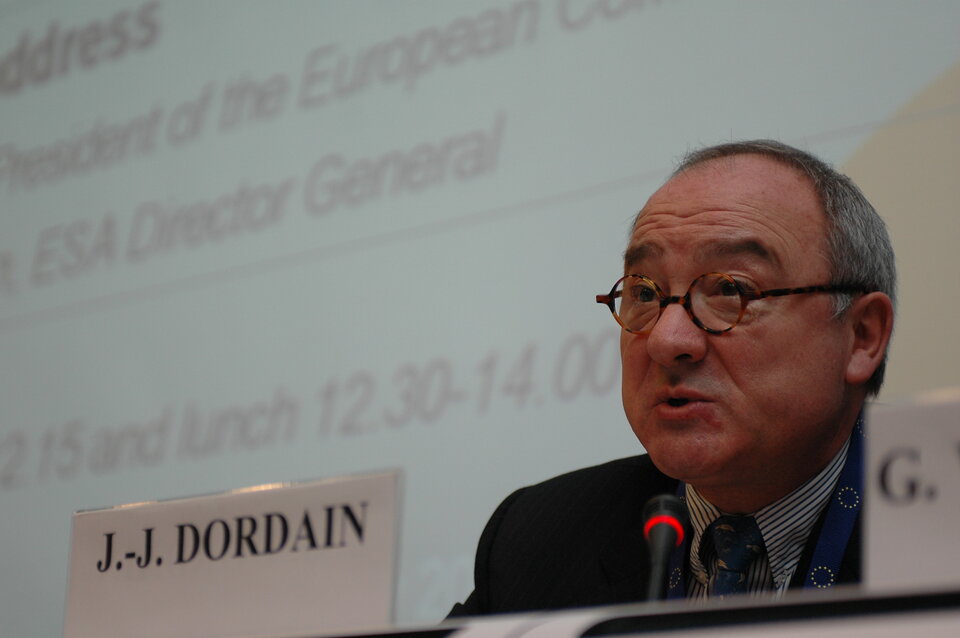
“Since 1975, the year of its foundation, ESA has been developing international cooperation, first within Europe and then beyond the boundaries of Europe. The US, Canada, Russia, Japan, China, India and most spacefaring countries are our partners, and we are ready to do more with our institutional partners worldwide and European space industry to further explore our Universe, and to better serve the needs of each citizen of the world in Earth Observation, Security, Telecommunications, Satellite Navigation, Meteorology and Space Science”, added Dordain.
In recent years ESA has been cooperating increasingly with a new partner, the European Union, through the European Commission.
ESA, an independent European agency, is not part of the EU. Some countries that belong to the EU are not members of ESA and vice versa. There are, however, close ties between the two organisations and they share a common aim: to strengthen Europe and benefit its citizens.

Although ESA has had ties with the EU since the EU was formed, these have grown in recent years because of the increasing role of space in strengthening Europe's political and economic role. Recent joint initiatives include the European global navigation system Galileo and the Global Monitoring for Environment and Security suite of services, known as GMES. An upcoming initiative concerns satellite-based measures to overcome the digital divide within Europe.
The Commission has been involved in space for many years through its research programmes, but its role has recently been reinforced. Responsibility for space policy and space applications has been transferred from the Research Directorate-General to that for Enterprise and Industry, under the responsibility of Vice-President Günter Verheugen.
“The Commission is currently working on a proposal for a genuine European Space Policy. Reaching for the stars brings very down to earth benefits to our citizens and industry, from radio navigation, communication by satellite or early warning of natural disasters. We need to step up cooperation, on an EU scale level and internationally. Nobody can go it alone. The Commission also wants to substantially increase R&D efforts for space under the new R&D Framework Programme and we are assessing how to combine this with investment in appropriate public-private partnerships” said Vice-President Verheugen, Commissioner for Enterprise and Industry, in charge of competitiveness and space matters.
Note for Editors
Strengthening ESA/EU relations
In March 2000 ESA commissioned a report (known as the “Wise Men’s report”) to examine the future needs of Europe in space and scenarios for the relationship between ESA and the EU.
In November that year the Councils of ESA and the EU met separately to adopt resolutions based on this document. These endorsed the setting up of a cooperative structure to bring together the ESA Executive and the European Commission. As a result, a high-level joint task force was set up to make proposals for the continuing development and implementation of the European Strategy for Space.
An ESA Ministerial Council meeting in November 2001 gave clear directions on the Agency's evolution and policy, and called for a Framework Agreement to formalise cooperation between ESA and the EU.
In January 2003 the Commission and ESA introduced a Green Paper on European Space Policy to look into Europe's strengths and weaknesses in the space sector in order to launch a debate on Europe's space policy with all players, including national and international organisations, the European space industry and its users, and Europe's scientific community and citizens.
In November 2003 the ESA Council adopted the Framework Agreement, previously endorsed by the EU Council in October 2003. This agreement recognises that both parties have specific complementary and mutually reinforcing strengths, and commits them to working together to avoid duplication of effort. It calls for the progressive development of a European space policy to link the demand for services and applications in support of EU policies with the supply, through ESA, of the space systems and infrastructure needed to meet that demand.
Also in November 2003 the Commission published a White Paper on Space. This action plan for implementing an expanded European space policy, drafted together with ESA, includes proposals for joint ESA-EC space activities and takes the Framework Agreement as its basis for implementation.
These agreements prepared the legal basis for cooperation between ESA and the EU, such as EU participation in ESA optional programmes and ESA management of EU space-related activities. ESA and the Commission will now be able to launch and fund joint projects, participate in each other's schemes, create joint management bodies, carry out joint studies, and jointly organise conferences and training of scientists.
In November 2004 the first ever European “Space Council” was held in Brussels. This was a major political milestone for Europe in Space, offering ministers representing the 27 European Union and/or European Space Agency Member States the first opportunity to jointly discuss the development of a coherent overall European space programme.
In the footprints of the Treaty establishing a Constitution for Europe, signed in October 2004 and for the first time defining “space” as a shared competence of the Union, the Space Council acknowledged the importance of space activities to a wide range of European policies.
The European Space Programme - expected to be endorsed by a Space Council session at the end of 2005 - will constitute a common platform including all activities and measures to be undertaken by the Commission, ESA and other stakeholders in order to achieve the objectives set by the European Space Policy.
Future cooperation is expected to cover areas such as science and technology, Earth observation, navigation, communications, human spaceflight and launchers. With all the benefits that cooperation brings, ESA is ready to play its role and encourage the increasing use of space to support European policies that improve the lives of its citizens.
For further information, please contact :
Franco Bonacina, ESA Spokesperson
Tel. + 33 1 5369 7155,
Fax. + 331 5369 7690
Gregor Kreuzhuber,
Spokesman for Commission Vice-President Günter Verheugen, Commissioner for Enterprise and Industry, in charge of competitiveness and space matters, Tel. + 32 2 296 65 65


